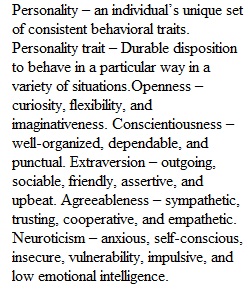


Q Chapter 11 Lesson Questions Please answer the following questions and submit them for grading. 1. Give a brief definition of personality and personality traits. 2. List the 5 BIG FIVE Personality Traits and list at least three characteristic "facets" for each. a. Which Big Five Trait is synonymous with Positive Emotionality? 3. Which of Freud's personality structures is governed by the "reality principle"? 4. Which of Freud's personality structures is governed by "moraltiy"? 5. List each of the six defense mechanisms we discussed in the audio lecture and describe them in your own words. 6. Define "Behaviorism". 7. Describe Skinner's thoughts on personality? 8. Did Social Cognitive Theorist, Bandura, agree with behaviorism? a. Define Self-efficacy. 9. What is "unique" about the "Humanistic" theories regarding personality and personal growth? 10. List the SIX "needs" that should be met in order to achieve "SELF-ACTUALIZATION" according to Maslow. a. What is the definition of "self-actualization"? b. Which of the six "needs" includes affiliation and acceptance? c. Which of the six "needs" includes order and beauty? 11. All of the BIG FIVE Personality traits have shown large correlations among identical twins!!!! Which Big Five personality trait has the highest intraclass correlation (.53) for identical twins? a. Which Big Five trait has the lowest correlation (.41) among twins?
View Related Questions